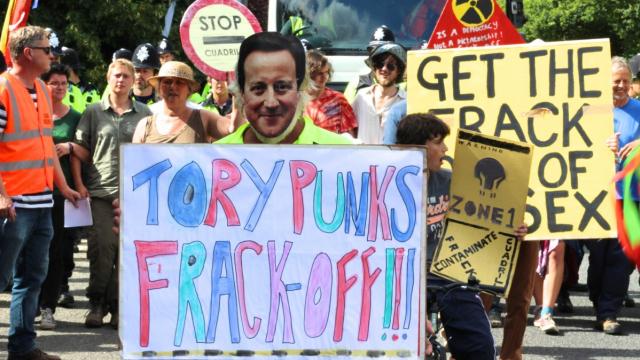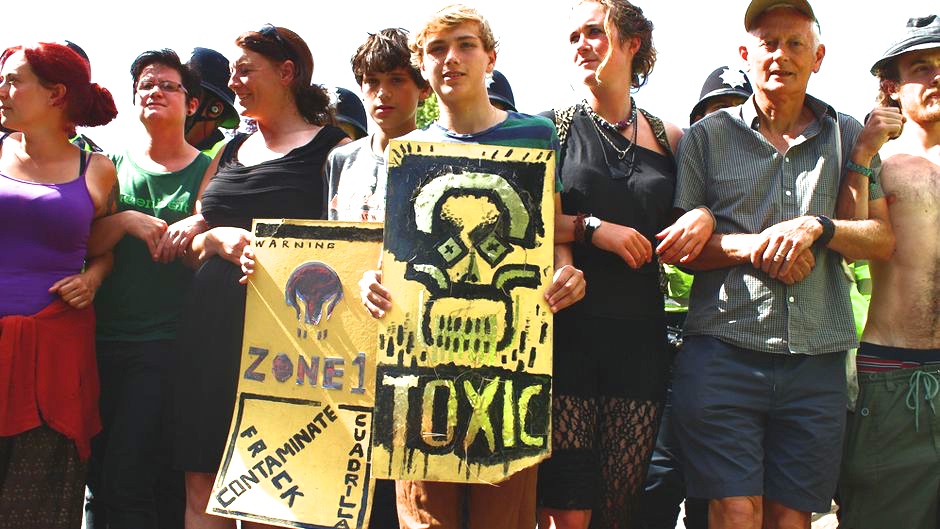
Following a Freedom of Information battle, the U.K.’s Department for Environment Food and Rural Affairs (Defra) has published a report exposing the previously undisclosed risks of fracking. The report includes how the process of shale gas extraction could have a negative effect on the environment, health and house prices in rural communities in the U.K.
According to the unredacted report – which the government was forced to publish after a decision made by the data watchdog Information Commissioner’s Office – fracking could damage the landscape in rural communities, increase traffic and noise, and reduce house prices.
The internal report, titled "Shale Gas: Rural Economy Impacts" was originally published by Defra in the summer of 2014. However, Defra admitted the report, which was heavily redacted, was “not analytically robust” and incomplete.
According to the BBC, around one-third of the original report contained redacted information, most of which paints fracking in the U.K. in a negative light.
Shortly after the report was published last summer, Defra defended the redactions, claiming the document contained potentially misleading information that might “undermine the public debate.”
Some of the deleted sections included information suggesting that houses in close proximity to fracking sites could fall in value by as much as 7%. Furthermore, rental prices in areas where shale gas exploration was taking place could be pushed upwards due to workers on the sites requiring rental accommodation.
The redacted report prompted Green Member of Parliament Caroline Lucas to accuse the government of censorship and deliberately covering up the negative consequences of fracking. Lucas urged the government to be “straight with the British public” about the detrimental effects fracking could cause to Britain’s countryside.
Among the deleted sections was information about fracking's impact on house prices and local services, noting how properties close to fracking sites in the U.S. and Canada have fallen by between 3% and 14%.
In June, the Information Commissioner’s office ruled the government must publish the full report in its unredacted version.
The study, dubbed by The Guardian as “an official assessment of the impact of fracking,” also suggested that properties within a five-mile radius of fracking sites could be forced to pay additional insurance costs to cover the risk of explosions caused by fracking.
Unlike the redacted report, which highlighted the job opportunities likely created through shale gas exploration, the unredacted version warned that the sustainability of fracking investments remains uncertain, particularly in rural communities.
The document described how fracking could have the potential to transform "formerly pristine and quiet" rural regions by bringing "increased industrialisation."
“As a result, rural community businesses that rely on clean air, land, water and/or a tranquil environment may suffer losses from this change such as agriculture, tourism, organic farming, hunting, fishing and outdoor recreation,” said the report.
Wastewater treatment facilities could also be negatively affected by fracking, added the report, and greenhouse gases could be pushed up globally if the displaced gas is used elsewhere.
Surprise Fracking Application Rejection
The release of the unredacted report comes at a timely moment, as Lancashire County Council in the north of England voted a surprise rejection of what would have been the biggest fracking exploration to date in the U.K.
Last month Lancashire County Council rejected a planning application by the shale gas explorer Cuadrilla simultaneous to the Defra report's publication in its unredacted form. When the recent verdict was announced that Cuadrilla’s application to frack at a site in Lancashire had been rejected, hundreds of anti-fracking protestors stood outside the council building reacting with cheers and delight. The decision was seen as a major blow to the U.K. fracking industry and a triumph for environmentalists.
Since details in the unredacted report have been published, Defra’s "Shale Gas: Rural Economy Impacts" document has created a whirl of commentary in the mainstream media in the U.K. The suggestion that fracking operations in rural areas could cause house prices to tumble by as much as 7% and create a risk of environmental damage has fueled a storm of debate.
Ironically, it's what alternative media, environmentalists and anti-fracking groups have been saying all along. For example, since forming in 2011, the group Frack Off has been committed to raising awareness about the harms caused by the "tidal wave of extreme energy extraction sweeping across the globe.”
There have been a number of anti-fracking protests staged in Britain in recent years. In 2014, when the original Defra shale gas report was released, anti-fracking activists glued themselves to the doors of a Defra government building in London to protest the 63 redactions. That same day, protestors blockaded the offices of Cuadrilla in Blackpool in the North of England.
Dressed in toxic hazard suits, the protests were part of a day of direct action carried out by the pressure group Reclaim the Power, which stands vehemently opposed to extreme energy extraction.
Now that not only the health risks but the financial consequences of fracking in Britain’s countryside have come to light, mainstream media, shale gas corporations and local authorities have to reckon with the fact that the U.K. won't be fracked as easily as they once thought.
3 WAYS TO SHOW YOUR SUPPORT
- Log in to post comments












